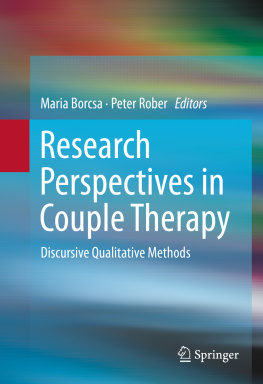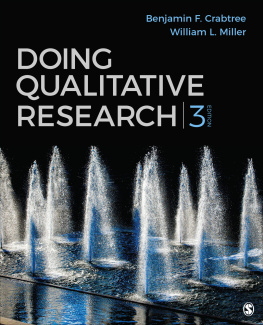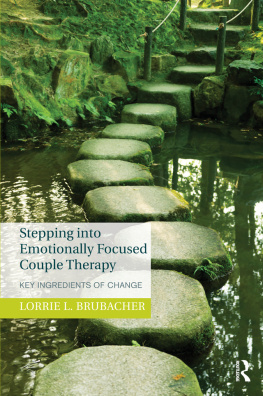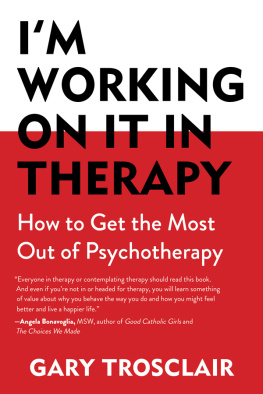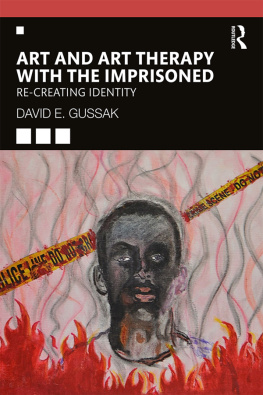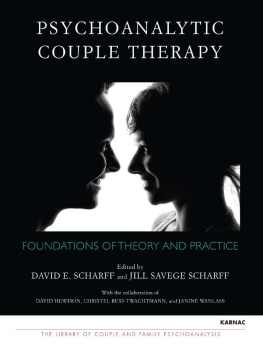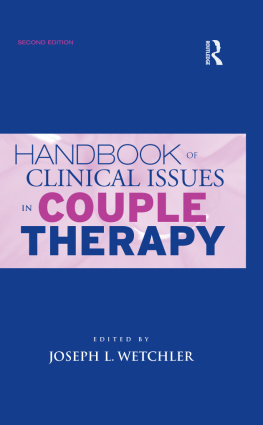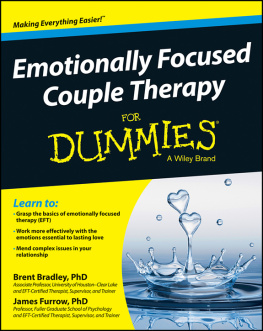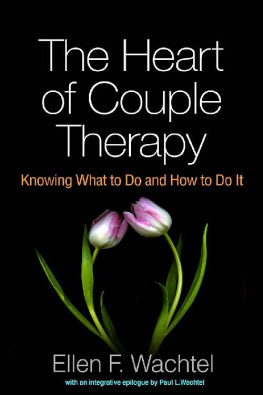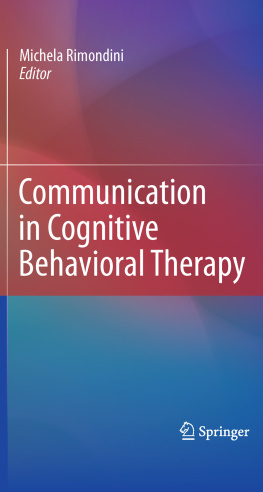Springer International Publishing Switzerland 2016
Maria Borcsa and Peter Rober (eds.) Research Perspectives in Couple Therapy 10.1007/978-3-319-23306-2_1
1. The Challenge: Tailoring Qualitative Process Research Methods for the Study of Marital and Family Therapeutic Sessions
In this book, we present different qualitative research (QR) approaches to study marital and family therapy (MFT) sessions. In several ways this is unusual. Up to now, although there has been increased interest in looking at psychotherapy in terms of discourse, narrative and dialogue, most psychotherapy research is still quantitative and psychotherapy research in the field of MFT is rather scarce. Furthermore, while QR is appreciated in the fields of sociology, pedagogy and anthropology, for instance, in the fields of clinical psychology and psychotherapy it has just started to be accepted as a valid kind of research. This is an especially important development as words and meaningsthe area qualitative research traditionally focuses onare central to psychotherapy in general and to MFT in particular, and qualitative methods can bring research closer to the complexity of MFT practice.
Clinicians and Researchers
Many practitioners have not found empirical research on psychotherapy very valuable for them (Lambert, ).
Against this background, the realisation began to grow that we need more process research in order to understand what makes psychotherapy work (Lambert, , p. 49).
Process research is probably more appealing for clinicians than RCT research, as it comes much closer to the unpredictable and ambiguous process of therapy that clinicians experience in their day-to-day practice. The unique story of the client, with his/her pain and suffering that mobilises therapists to give it their best shot to be helpful, resonates in this kind of research that strives to be faithful to the clients voice. This is important, especially in the field of MFT, where there has always been a strong focus on therapists in their daily practices rather than on research or theory (Sprenkle & Piercy, ). The field grew because these charismatic pioneers inspired therapists with their ideas about the importance of families and interactional patterns. Models were developed based on clinical experience with families, and schools were established. During the first decades, theory and research served especially to legitimate the clinical expertise of the pioneers. When later MFT researchindependent of the main family therapy schoolsbegan to blossom, this resulted in a research-practice gap, in which the clinicians often feel unappreciated and misunderstood by the researchers, and in which the researchers disdain the clinicians and underestimate the importance of the experience, the intuition and the wisdom of the latter. Clinicians dismiss research as irrelevant and difficult to understand, while researchers fail to understand that they can only do research if resourceful and creative clinicians come up with new ideas of new techniques that they can test later for their effectiveness.
Experience and Process
While the gap between clinical practice and research has widened due to the strong emphasis on evidence-based approaches and RCT research (Lambert, ).
QR can have at least two foci in the field of psychotherapy: experience and process of therapy (McLeod, ).
Besides research into the experience of therapy, there is also research on the process of therapy. In these kinds of research studies, it is as if you look at psychotherapy with a microscope (McLeod, ). Notwithstanding this common philosophical foundation, CA, DA and NA can be distinguished from one another in the way they emphasise different aspects of social construction in their practical application.
A Closer Look at CA, DA and NA
While CA and DA both exist in different shapes and forms (e.g. poststructuralist DA, discursive DA and so on), it is not so easy to define exactly what the difference between CA and DA is. Let us look at these approaches in more detail. We will characterise each of them and give one example of a study that illustrates what is typical about this approach.
Conversation analysis: To put it (too) simply, we could say that conversation analysis focuses mainly on talk-in-interaction. In CA, there is an emphasis on the way interlocutors accomplish, through their languageboth verbal and nonverbalon a turn-to-turn basis, the production of interactional regularities like alliance (Sutherland & Couture, ). In their study, they focus on advice as an interactional accomplishment to which both clients and therapists contribute rather than a unilateral act administered by the counsellor to the client. They describe the communicative processes and strategies involved in the offering of advice in the context of family therapy. They show that advice-giving does not necessarily involve an all-knowing therapist enlightening the family about the right things to do. Their analysis reveals that advice-giving can also be a dialogical, cyclical, stepwise process of opening space for new possibilities and forward-moving orientations for the family.
Discourse analysis: in contrast with CA, in discourse analysis the focus is not only on what happens between the interlocutors, but also on external sociocultural power relations that invade and shape the interlocutors interactions. So the DA researcher is interested in the way societal discourses around health (Avdi, ) is a good example of the use of DA to study the process of psychotherapy. The paper is aimed at examining the process of therapy with families in which one member has a diagnosis of psychosis and focusses on shifts in the subject positions occupied by the identified patient in the clinical dialogue. The study demonstrates that DA provides a useful method for the detailed study of the ways in which meanings evolve within the clinical dialogue, as it zooms in on collapses of meaning and narrative, and on alienation from shared communicative practices, in psychosis. The study suggests that an important aspect in clinical work with these families relates to the repositioning of the patient and on facilitating flexible, agentic and reflexive subject positions.
In the study of Karatza and Avdi, the concept of positioning is central (Davies & Harr, ). More dynamic than the sociological concept of role , it points to the rights and duties of a person in a certain social interaction. It refers to the meanings that people discern in the actions of others and that they give to what they do themselves as normative constraints or opportunities for action in a certain local conversation. The concept of positioning enables DA to spell out some of the ways in which clients (and sometimes therapists) are trapped in constraining discursive contexts that limit their possibilities for action. It also allows DA to describe ways in which therapists can offer their clients alternative paths with a broader range of choices.
Narrative analysis: besides CA and DA, narrative analysis (NA) also can be used to qualitatively study a psychotherapy process (McLeod, ) in which they examined the process of storytelling about domestic violence in a family therapy session. The analysis made it possible to describe storytelling in family therapy as a collaborative, dialogical process, accomplished by all participants in the conversation. The recounting of stories of violence seemed to go hand in hand with more repressive modes of interaction that discouraged the telling of these stories. In the back-and-forth process between voices of hesitation and voices of reassurance, the level of safety in the session is weighed by the participants. In so far as the voices of hesitation can be reassured of the safety, it becomes gradually possible to talk about delicate, problematic experiences such as violence in the family.

